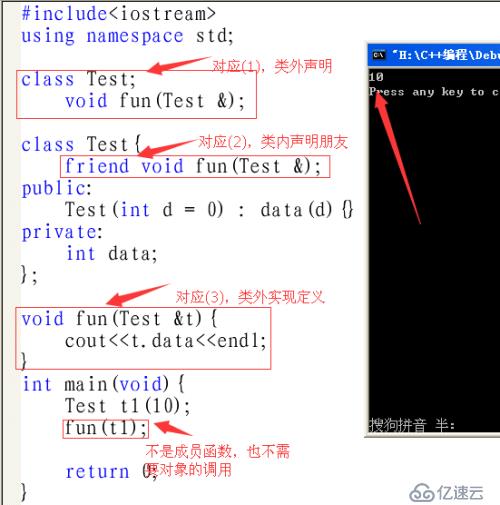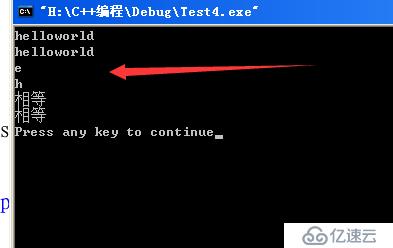1、友元函数
在类中一般的成员函数具备:
(1)、该函数能访问类中的私有部分
(2)、该函数位于类的作用域之中
(3)、该函数必须经由一个对象去激活,也就是说有一个this指针;
友元函数不同之处:
(1)、在#include<iostream> using namespace std;的前提下,必须的类外先声明;
class Test; void fun(); //有元函数的声明
但是在#include<iostream.h>中不用这个有元函数的声明;这是早期头文件的包含。
(2)、在类内必须声明是朋友,friend(关键字),函数声明
class Test{
friend void fun(); //朋友没有公有,私有,保护之分,所以限定修饰符在这不起任何作用
};(3)、在类外实现方法的定义,此时不用再加friend了;
void fun(){
..........
}有元函数具有的特性:该函数能访问类的私有数据;不是该类的成员函数,也不需要对象驱动;

还有友元类,跟其使用一样,类中所有函数均可调用其朋友的私有数据;
2、运算符的重载(个人认为C++中运算符的重载很有用,也很重要)
相当于函数的调用,对其的另一种更加人文化的解释,并告诉 C++编译器,遇到该重载运算符时调用此函数。
定义运算符重载的一般格式:
返回值类型 类名::operator重载的运算符(参数列表);
假如出现复数类:
Complex{
public:
.....
private:
int real;
int p_w_picpath;
};//主函数中: Complex t1(1, 2); Complex t2(2, 3); Complex t3; t3 = t1 + t2;
此时t1和t2的类型不定,就得对+进行运算符的重载;使其更符合人文化,其本质不变,t1.operator+(t2);
对象的类型不定,编译器不知道怎么输出,自己就得对<<和>>运算符进行重载,以达到输出对象的目的。还必须是友元函数;
class Complex; //这是第一步,类外声明。
ostream& operator<<(ostream &out, const Complex &c);
istream& operator>>(istream &in, Complex &c);
class Complex{ //这是第二步,对其在类内说明是朋友。
friend ostream& operator<<(ostream &out, const Complex &c);
friend istream& operator>>(istream &in, Complex &c);
};
ostream& operator<<(ostream &out, const Complex &c){
out<<"("<<c.m_real<<","<<c.m_imag<<")";
return out; //这是第三步,在类外进行定义。
}
istream& operator>>(istream &in, Complex &c){
in>>c.m_real>>c.m_imag;
return in;
}关于这个<<对应一个要输出的值,在定义时,不用endl,回车。
对于Complate类的补充,t1 = t2 + 10; //成员方法重载即可。内部有一个隐藏参数
t1 = 10 + t2; //没有对象驱动,还要10.operator+(t2);是错的,所以此时用友元函数,传两个参数就是有两个参数。
运算符的重载要注意:
(1)、operator后面是一个合法的运算符,将右操作数做为函数的实参;
(2)、++ --前后的问题,用函数重载区分,后加的(int)参数;
(3)、?: . .* :: sizeof不能重载,其它的应该都可以进行重载;
例1:++i 和 i++有什么区别?
对其进行重载,如下:
#include<iostream>
using namespace std;
class Int;
ostream& operator<<(ostream &out, const Int &s);
class Int{
friend ostream& operator<<(ostream &out, const Int &s);
public:
Int(int m = 0) : t(m){}
~Int(){}
public:
Int& operator++()//++t 先加1,再将此对象的引用返回
{
t++;
return *this;
}
Int operator++(int) //t++ 后加的要有一个参数int区分,
{
Int tmp(t); //创建一个临时对象,
t++; //原有对象加了一下,
return tmp; //返回临时对象,后加。
}
private:
int t;
};
ostream& operator<<(ostream &out, const Int &s){
out<<s.t;
return out;
}
int main(void){
Int t1(6);
Int t2;
Int t3;
t2 = ++t1;
cout<<"t1 = "<<t1<<", t2 = "<<t2<<endl; //对输出运算符重载了,才能输出对象。
t3 = t1++;
cout<<"t1 = "<<t1<<", t3 = "<<t3<<endl;
return 0;
}运行结果如下:

从结果可以看出,确是实现了,这块的本质是运算符对++的重载。
前加,返回的是引用,后加还得调用构造函数和拷贝构造;所以前加++i;效率更高,运行速度也更快。
例2、String类
#include<iostream>
#include<string.h>
#include<assert.h>
using namespace std;
class String;
ostream& operator<<(ostream &out, const String &str);
class String{
friend ostream& operator<<(ostream &out, const String &str);
public:
String(const char *str = ""){
if(str == NULL){
data = new char[1];
data[0] = 0;
}else{
data = new char[strlen(str) + 1];
strcpy(data, str);
}
}
//String(const String &str){}
String& operator=(const String &str){
if(this != &str){
delete []data;
data = new char[strlen(str.data) + 1];
strcpy(data, str.data);
}
return *this;
}
~String(){
delete []data;
}
public:
String operator+(const String &str){
char *tmp;
tmp = new char[strlen(data) + strlen(str.data) + 1];
strcpy(tmp, data);
strcat(tmp, str.data);
return String(tmp);
}
void operator+=(const String &str){
char *new_data = new char[strlen(data) + strlen(str.data) + 1];
strcpy(new_data, data);
strcat(new_data, str.data);
delete []data;
data = new_data;
/*
realloc(data, strlen(data) + strlen(str.data) + 1); //此时对原有的数组空间进行动态扩长,
// 给谁扩长 加上原先,一共要有多长 即原有值不变。
strcat(data, str.data);
*/
}
char operator[](int pos){
assert(pos >= 0 && pos < strlen(data));
return data[pos];
}
char operator*(){
return data[0];
}
bool operator==(const String &str){
return strcmp(data, str.data) ? false : true;
}
bool operator!=(const String &str){
return !(*this == str); //调用==这个编写过的函数
}
private:
char *data;
};
ostream& operator<<(ostream &out, const String &str){
out<<str.data;
return out;
}
int main(void){
String s1("hello");
String s2("world");
String s3;
s3 = s1 + s2;
cout<<s3<<endl;
s1 += s2;
cout<<s1<<endl;
cout<<s1[1]<<endl;
cout<<*s1<<endl;
if(s1 == s3){
cout<<"相等"<<endl;
}else{
cout<<"不相等"<<endl;
}
if(s1 != s3){
cout<<"不相等"<<endl;
}else{
cout<<"相等"<<endl;
}
return 0;
}对其+,+=,[],*,==,!=进行了运算符的重载,结果如下:

3、const和static
在C++中const是非常重要的,现在说明常函数之间的关系:普通函数可以调用常函数,常函数不能调用普通函数(因为没有this);
void fun()const{}
void fun(){} //一个有const,一个没有,参数类型不一样,所以这是函数的重载!
static在C++中有成员和方法,静态成员的在类外初始化;类的静态成员为所有对象所共享。
静态方法: (1)、可以调用该类的私有成员,(2)、应该位于类的作用域之中;(3)、类名直接调用,可以不用方法;
静态方法只能调用静态成员,和静态函数;非静态的可以调用静态成员或方法。
免责声明:本站发布的内容(图片、视频和文字)以原创、转载和分享为主,文章观点不代表本网站立场,如果涉及侵权请联系站长邮箱:is@yisu.com进行举报,并提供相关证据,一经查实,将立刻删除涉嫌侵权内容。